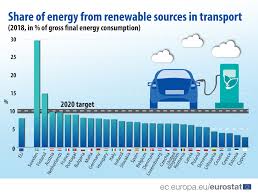The Future of Transportation: Embracing Clean Energy
In recent years, the world has witnessed a growing shift towards clean energy transportation as a means to combat climate change and reduce environmental impact. The traditional reliance on fossil fuels for transportation has led to harmful emissions that contribute significantly to air pollution and global warming.
Embracing clean energy transportation solutions, such as electric vehicles (EVs), hydrogen fuel cell vehicles, and biofuels, offers a promising alternative to conventional petrol and diesel-powered vehicles. These technologies not only help reduce greenhouse gas emissions but also promote energy efficiency and sustainability.
Electric Vehicles (EVs)
Electric vehicles have emerged as one of the most popular forms of clean energy transportation. By running on electricity stored in rechargeable batteries, EVs produce zero tailpipe emissions, making them environmentally friendly alternatives to traditional internal combustion engine vehicles. With advancements in battery technology and infrastructure development, the adoption of EVs is steadily increasing worldwide.
Hydrogen Fuel Cell Vehicles
Hydrogen fuel cell vehicles utilise hydrogen gas to produce electricity through a chemical reaction with oxygen, generating power to drive the vehicle’s electric motor. These vehicles emit only water vapour as a by-product, making them completely emissions-free. While hydrogen fuel cell technology is still in its early stages, ongoing research and development efforts aim to make it a viable option for clean energy transportation.
Biofuels
Biofuels are derived from organic materials such as crops, waste oils, and algae. They offer a renewable alternative to fossil fuels and can be used in existing combustion engine vehicles with minimal modifications. Biofuels help reduce carbon dioxide emissions and promote sustainable practices in the transportation sector.
As we move towards a more sustainable future, investing in clean energy transportation is essential for mitigating the environmental impact of our daily commutes and travel habits. Governments, industries, and individuals must work together to accelerate the transition towards cleaner and greener modes of transportation for a healthier planet.
Five Essential Tips for Embracing Clean Energy Transportation in the UK
- Consider using electric vehicles for a cleaner mode of transportation.
- Utilize public transport or carpooling to reduce emissions from individual vehicles.
- Invest in bicycles or walking as eco-friendly alternatives for short trips.
- Explore renewable energy sources such as solar power for charging electric vehicles.
- Support initiatives that promote the development and use of clean energy transportation options.
Consider using electric vehicles for a cleaner mode of transportation.
When looking to reduce your carbon footprint and contribute to a cleaner environment, consider opting for electric vehicles as a sustainable mode of transportation. Electric vehicles produce zero tailpipe emissions, helping to improve air quality and mitigate the impact of transportation on climate change. By choosing electric vehicles, you can play a significant role in promoting clean energy transportation and moving towards a more sustainable future for our planet.
Utilize public transport or carpooling to reduce emissions from individual vehicles.
By utilising public transport or carpooling, individuals can significantly reduce emissions from individual vehicles, contributing to cleaner air and a healthier environment. Opting for shared modes of transportation helps decrease the overall carbon footprint associated with daily commutes and travel. By sharing rides, we not only reduce traffic congestion but also promote sustainable practices that benefit both the planet and our communities. Making a conscious choice to use public transport or carpooling is a simple yet impactful way to support clean energy transportation initiatives and work towards a more sustainable future.
Invest in bicycles or walking as eco-friendly alternatives for short trips.
Investing in bicycles or choosing to walk for short trips is a simple yet effective way to embrace clean energy transportation. By opting for these eco-friendly alternatives, individuals can reduce their carbon footprint, improve their health, and contribute to a cleaner environment. Cycling and walking not only help decrease greenhouse gas emissions but also promote physical activity and reduce traffic congestion in urban areas. Making the conscious choice to use bicycles or walk for short distances is a sustainable lifestyle change that benefits both individuals and the planet as a whole.
Explore renewable energy sources such as solar power for charging electric vehicles.
By exploring renewable energy sources like solar power for charging electric vehicles, we can significantly reduce our carbon footprint and embrace a more sustainable approach to transportation. Harnessing the power of the sun to charge EVs not only helps lower greenhouse gas emissions but also promotes energy independence and resilience. By utilising clean energy from solar panels, we can make our daily commutes more environmentally friendly and contribute to a greener future for generations to come.
Support initiatives that promote the development and use of clean energy transportation options.
Supporting initiatives that promote the development and use of clean energy transportation options is crucial in advancing towards a more sustainable future. By backing projects and policies that encourage the adoption of electric vehicles, hydrogen fuel cell vehicles, and biofuels, we can significantly reduce our carbon footprint and contribute to a cleaner environment. These initiatives play a vital role in accelerating the transition to greener modes of transportation, ultimately leading to improved air quality, reduced greenhouse gas emissions, and a more sustainable planet for future generations.
